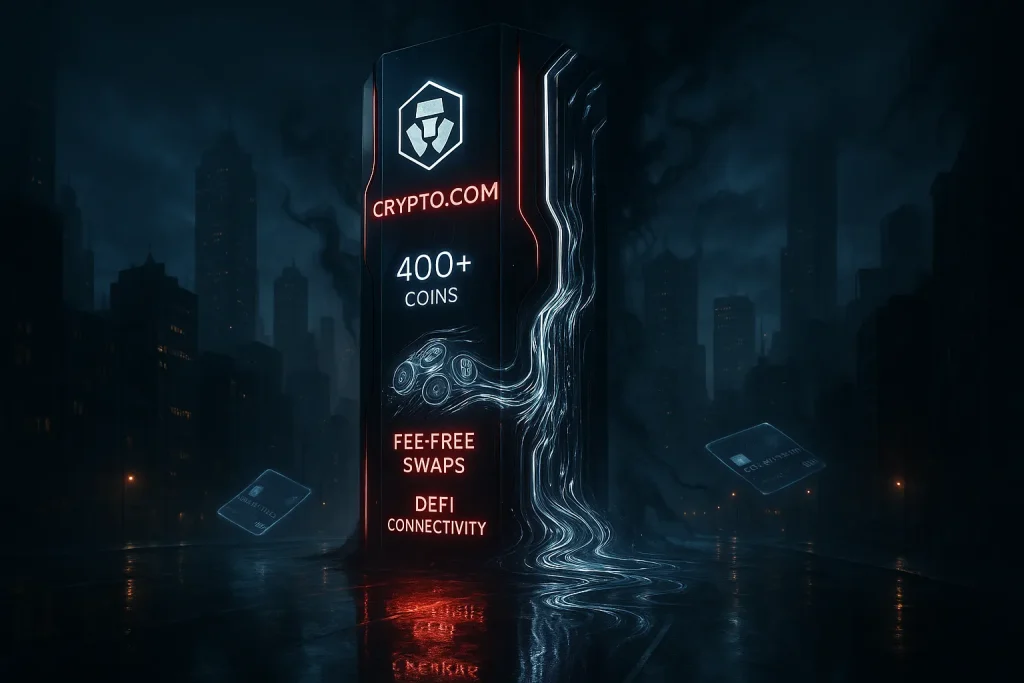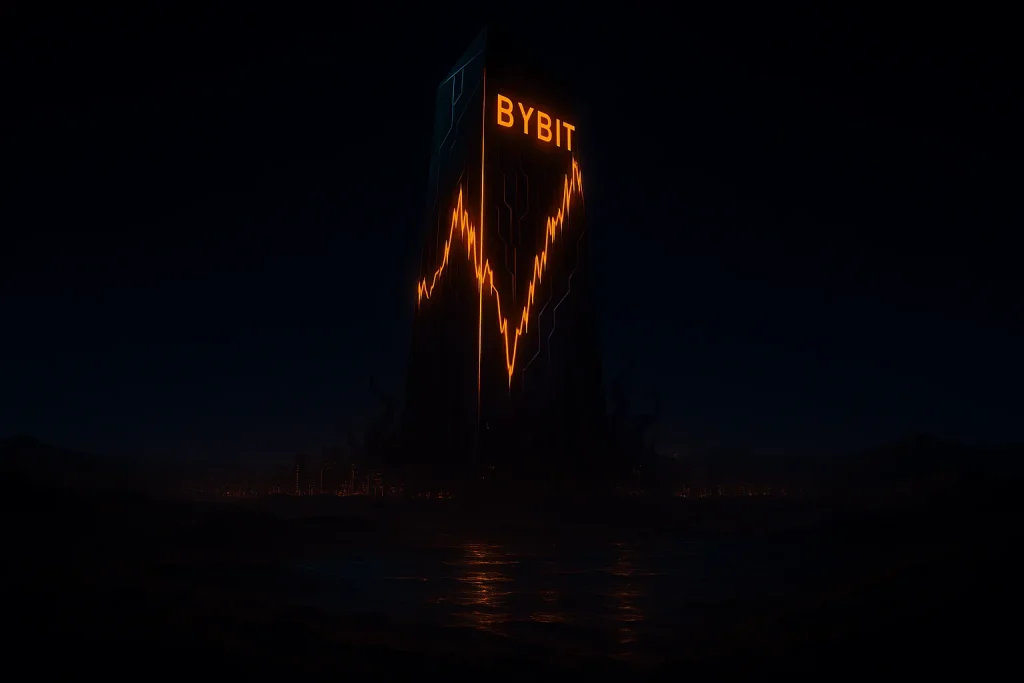Step right into the crypto carnage, where Bitcoin rockets past $112K, memecoins multiply faster than tinfoil-hat rumors on X, and exchanges can serve as either your magic money printer or a one-stop express to Rektville.
The calendar reads 2025, and picking a trading hub feels like choosing a starship during an alien siege. One wrong move and you’re cosmic debris. Relax, hustlers.
We trekked across the blockchain wastelands, plus a few eyebrow-raising forums, to unearth the 10 best crypto trading platforms for 2025. Each platform is fortress-grade secure, overflowing with tokens, and smooth as butter.
Strap in; we’re charging into the madness with a grin and a pocketful of optimism.
What Is a Cryptocurrency Trading Platform?
A crypto trading platform (everyone just calls it an exchange) is basically your online swap meet for digital coins, the place where you haggle, flip, and barter tokens while wearing pajama pants. Picture a somewhat sketchy broker darting between you and a basement-dwelling HODLer, making sure your Bitcoin doesn’t vanish into thin air.

Imagine Wall Street, only instead of Apple stock you’re trading BTC for ETH or throwing spare sats at a memecoin named after a cat in a spacesuit. One side of every deal is always crypto, and the site keeps things (mostly) on the level with security checks and uptime promises.
Back in the day, scoring coins meant running a clattering mining rig or lurking in shady Web3 forums. A total frontier circus, right? Now exchanges make the whole thing as simple as ordering pizza (no pineapple wars, please). Buckle up; here’s the lowdown on the three main species.
- Centralized Crypto Exchanges (CEXs): The big bosses of crypto trading, CEXs are like banks with a blockchain fetish. They’re regulated, meeting AML (Anti-Money Laundering) and CFT (Countering Financing of Terrorism) rules, with a central authority enforcing policies. Security is Fort Knox-level: KYC (Know Your Customer) with ID and IP verification, 2FA (two-factor authentication), phishing protection, firewalls, Customer Due Diligence, and transaction monitoring. Most store funds in cold wallets (offline storage), and third-party audits keep them honest. Downside? They can freeze your account fast if you trip their compliance alarms. Perfect for safety-first traders but a pain for privacy hawks.
- Decentralized Crypto Exchanges (DEXs): These are the anarchist communes of crypto, running on smart contracts (self-executing code on the blockchain) with no central overlord. Trades happen on-chain, offering transparency and anonymity. No KYC nonsense. That’s sexy for privacy lovers. Your funds stay in your wallet, not some exchange’s vault. Catch? Transaction fees (gas) can sting, and blockchain speed limits make high-frequency trading a pipe dream. Plus, the interfaces can be clunkier than a 90s website. Great for DeFi degens who trust code over corporations.
- Peer-to-Peer (P2P) Platforms: P2P exchanges are like crypto Craigslist, connecting buyers and sellers directly. No KYC, just escrow (a temporary holding account) to ensure nobody gets scammed. You pick your trade offers, and fees are low, with the option to cancel deals (unlike DEXs). Ideal for long-term investors, but watch out—fraud risk is higher, despite user ratings. Transactions can be slower than a sloth on sedatives. Good for privacy lovers who don’t mind a gamble.
The Top 10 Crypto Exchanges for 2025
This post focuses on CEXs because they’re the safest, most user-friendly option for most traders, especially newbies. Let’s meet the top ten CEXs ruling the 2025 crypto scene.
1. Kraken

Why It’s Great: Kraken is a crypto trading platform that has been navigating the crypto seas since 2011 without a single hack—suck it, FTX! With 400+ cryptocurrencies, from Bitcoin to the latest memecoin, Kraken’s got variety. Fees are low (0.01%-0.02% margin, 0.16% maker/0.26% taker for spot), and liquidity is deeper than a Reddit thread on a bear market. Regulated in the US, UK, and beyond, it uses cold storage for 95% of funds and offers staking (up to 24% APY on ETH or SOL). The Pro platform serves advanced traders with charts sharper than a shiv, while beginners love the instant-buy feature.
Who’s It For?: Newbies seeking safety and pros craving tools.
Standout Features:
- Cold storage keeps funds safer than a vault in a zombie apocalypse.
- Staking rewards for passive income while you doomscroll X.
- 24/7 support with Reddit-lurking agents for quick fixes.
Fiat support for USD, EUR, CAD via bank transfers or cards.
Downsides: Not available in some US states (sorry, New York), and no FDIC insurance—crypto’s wild, yo.
Pro Tip: Use Kraken Pro for low fees and staking. Check Kraken’s fiat options for your currency.
2. Coinbase

Why It’s Great: Coinbase is the crypto trading platform equivalent of a cozy Starbucks; pricey but welcoming. Supporting 200+ coins, its UI is smoother than a politician’s promise. Regulated by the SEC and FinCEN, it uses cold storage and multiparty computation (MPC) for security. Fees hurt: 0.5% spread, up to 0.6% maker/taker on Coinbase Advanced. But with a Visa debit card, self-custodial wallet for DeFi, and educational quizzes paying in crypto, it’s beginner heaven.
Who’s It For?: Newbies and altcoin diversifiers.
Standout Features:
- Coinbase Wallet for NFTs and DeFi—buy that $10,000 pixel monkey.
- Copy trading and learning rewards to earn while you learn.
- Fiat support for USD, GBP, EUR via bank or card.
- Beta NFT platform with zero creator fees.
Downsides: High fees for small trades; support can lag like a congested blockchain.
Pro Tip: Use Coinbase Advanced for lower fees or Coinbase One ($29.99/month) for tax tools.
3. Binance

Why It’s Great: Binance is the T-Rex of crypto trading platforms, with a 38% market share and $14B+ daily volume. It lists 480+ coins, from BTC to sketchy memecoins, with spot, futures, and options trading at up to 125x leverage. Fees are cheap (0.075% maker/taker), and it supports 10+ fiat currencies. Copy trading, a Web3 wallet, and Binance Pool for cloud mining make it a beast. US users get Binance.US, a lighter version with ~100 coins due to regulatory drama.
Who’s It For?: Traders wanting variety and leverage.
Standout Features:
- Binance Pool for mining without a noisy rig.
- Staking and Simple Earn for passive income.
- SEPA transfers and card buys for fiat access.
- Educational resources to dodge scamcoins.
Downsides: Binance.US is limited; past SEC issues spook some.
Pro Tip: Hold BNB for fee discounts and check CoinGecko’s trust score.
4. MEXC

Why It’s Great: MEXC is the crypto exchange equivalent of a candy shop, with 2,200+ coins, including every memecoin X is hyping. Launched in 2018, it offers zero maker fees on spot trades and 0.02%-0.05% taker fees. Serving 160+ countries, it supports 30+ fiat currencies via SEPA, MoonPay, and AlchemyPay. Security is solid (no major hacks), with auctions, staking, and futures trading for altcoin hunters.
Who’s It For?: Altcoin chasers and moonshot seekers.
Standout Features:
- Massive coin selection—BTC to hamster tokens.
- Free spot trading for makers, cheaper than a clearance rack.
- Copy trading and bots for automated gains.
- Pre-market trading for new tokens.
Downsides: Interface can overwhelm newbies; less regulated than US platforms.
Pro Tip: Use pre-market trading but DYOR to avoid rug-pulls.
5. Crypto.com

Why It’s Great: Crypto.com is the Tesla of crypto trading platforms. Sleek, mobile-first, and obsessed with CRO. With 400+ coins, fee-free crypto-to-crypto trades, and low fees (0.15% via Betterment), it’s a winner. Regulated in the US and UK, it offers third-party asset insurance, staking, and a Visa card with 5% cashback. Its Web3 wallet connects to DeFi, perfect for crypto bros.
Who’s It For?: Mobile traders and Bitcoin maximalists.
Standout Features:
- Crypto.com Visa card with CRO cashback.
- Fee-free crypto swaps and low-cost fiat buys.
- Staking for high APY on CRO, ETH.
- Biometric authentication and cold storage.
Downsides: CRO-heavy rewards feel scammy; advanced features aren’t newbie-friendly.
Pro Tip: Link to Betterment for low-fee portfolios.
6. Gemini

Why It’s Great: Gemini, run by the Winklevoss twins, is the Fort Knox of crypto trading platforms with SOC 2 certification and NYDFS licensing. Supporting 70+ coins, it’s secure with cold storage and insurance for custodial assets. Fees are moderate (0.2% maker/0.4% taker), and ActiveTrader offers advanced charting. Fiat support (USD, GBP, EUR) and staking make it a US favorite.
Who’s It For?: Security-conscious beginners and US traders.
Standout Features:
- FDIC-like insurance for custodial funds.
- Gemini Earn for staking.
- Credit card for instant buys.
Downsides: Limited coins; higher fees than Binance.
Pro Tip: Use ActiveTrader for lower fees; check Gemini’s compliance.
7. Bybit

Why It’s Great: Bybit is a crypto exchange based in Dubai that serves 60 million users and has 700+ assets. It’s a derivatives king with futures, options, and perpetual swaps at 100x leverage. Fees are low (0.01% maker/0.06% taker), and it supports fiat via SEPA and cards. Copy trading and trading bots make it accessible; cloud mining adds passive income.
Who’s It For?: Leverage junkies and altcoin traders.
Standout Features:
- High leverage for big bets (use cautiously).
- Trading bots for automation.
- Fiat support for 10+ currencies.
Downsides: Requires KYC; not available in the US.
Pro Tip: Test strategies with Bybit’s demo account.
8. Uphold

Why It’s Great: Uphold is a crypto trading platform mixes crypto, stocks, and metals, supporting 300+ coins. Its transparent pricing (0.8%-1.2% spread) and no withdrawal fees are a win. Regulated in the US and UK, it offers staking and a debit card. The Anything-to-Anything feature lets you swap BTC for gold instantly.
Who’s It For?: Diversifiers wanting crypto and traditional assets.
Standout Features:
- Multi-asset trading across crypto, stocks, metals.
- No withdrawal fees—keep your gains.
- Staking for coins like XRP.
Downsides: No futures; spreads hurt small trades.
Pro Tip: Use Uphold’s app for quick swaps.
9. KuCoin

Why It’s Great: KuCoin’s the underdog of the crypto exchange world with 700+ coins and a 20% market share in spot trading. Fees are competitive (0.1% maker/taker), with futures, staking, and lending. The Spotlight program offers early token access. Supports fiat via Simplex and Banxa.
Who’s It For?: Altcoin fans and passive income seekers.
Standout Features:
- Spotlight for new tokens.
- KuCoin Earn for staking/lending.
- Trading bots for hands-off profits.
Downsides: Less regulated; spotty support.
Pro Tip: Use referral program for fee cuts; check CoinMarketCap for token legitimacy.
10. OKX

Why It’s Great: OKX is a rather large crypto trading platform that serves 50 million users with 300+ coins, offering spot, margin, and derivatives trading. Fees are low (0.08% maker/0.1% taker), and its Web3 wallet connects to DeFi/NFTs. Cloud mining and staking pools add passive income. Supports fiat via SEPA and cards.
Who’s It For?: Global traders and DeFi explorers.
Standout Features:
- Web3 wallet for DeFi/NFTs.
- Low fees and high liquidity.
- Staking pools for passive income.
Downsides: No US access; complex interface.
Pro Tip: Use OKX’s demo trading for leverage practice.
How to Choose the Best Crypto Trading Platform
Picking a crypto exchange is like choosing a dive bar in a sketchy galaxy. Vibes, safety, and quality matter. Here’s a beefed-up guide to find your perfect crypto exchange platform:

- Security: Prioritize cold storage (offline wallets), 2FA (Google Authenticator or YubiKey), and multisig wallets (multiple keys for transactions). Kraken and Gemini have no major hacks; check CER.live for trust scores. Look for third-party audits and insurance (Gemini’s custodial coverage). Avoid platforms with a history of breaches or X complaints about frozen funds.
- Fees: Compare maker/taker fees (adding/removing liquidity) and spreads (buy-sell price gap). MEXC’s zero maker fees and Binance’s 0.075% are steals; Coinbase’s 0.5% spread bites. Watch for withdrawal fees—Uphold’s free, but others charge per coin. Use CoinTracker to estimate trading costs.
- Coin Selection: Need BTC and ETH? Any CEX works. Chasing memecoins? MEXC or KuCoin’s 2,200+ coins are king. Verify coins on CoinMarketCap to avoid scams. Check for new listings if you’re hunting moonshots.
- Regulation: US users need FinCEN or NYDFS-compliant platforms (Coinbase, Gemini). Global users can explore MEXC or OKX, but check local laws to avoid bans. Visit exchange websites (e.g., Kraken’s legal page) for restrictions.
- Ease of Use: Beginners need intuitive apps—Coinbase and Crypto.com shine. Pros want advanced charting and leverage—Kraken Pro or Binance. Test the UI via demo accounts (Bybit, OKX) before committing.
- Fiat Support: Ensure your currency (USD, EUR, GBP) is supported. Kraken and Binance offer SEPA; Coinbase and Uphold take cards. Check deposit/withdrawal fees—cards can hit 3%.
- Liquidity: High trading volume ensures better prices and faster trades. Binance’s $14B daily volume leads; Gemini lags for niche coins. Check CoinGecko for volume data.
- Features: Want passive income? Try staking (Kraken, Crypto.com) or lending (KuCoin). Need leverage? Bybit or Binance. DeFi/NFTs? Coinbase or OKX’s Web3 wallets. P2P trading? Binance or KuCoin.
- Customer Support: Test live chat or email response times. Kraken’s Reddit presence is clutch; Coinbase can lag. Check Trustpilot or r/CryptoCurrency for user feedback.
- Geographic Availability: Binance.US is limited; OKX skips the US. Confirm availability on exchange sites or X community threads.
- CEX vs. DEX vs. P2P: CEXs (like our top 10) are best for beginners due to security and ease. DEXs (e.g., Uniswap) suit DeFi pros but have high gas fees and complex UIs. P2P platforms (e.g., LocalBitcoins) offer privacy but risk fraud. Choose based on your risk tolerance and trading style.
Pro Tip: Shortlist 2-3 crypto exchanges based on your needs (e.g., Coinbase for beginners, MEXC for altcoins). Read X reviews and Reddit threads (e.g., r/CryptoExchange) for real user vibes, but filter out shills.
Wrapping Up
The 2025 crypto market is a carnival of madness, and these ten CEXs are your VIP tickets.
Kraken’s the unhackable beast, Coinbase is the newbie’s nanny, Binance is the trader’s jungle, MEXC is the altcoin candy store, Crypto.com is the mobile maestro, Gemini’s the security nerd, Bybit’s the leverage lord, Uphold’s the multi-asset maverick, KuCoin’s the people’s champ, and OKX is the global giant.
Pick one (or a few), start small, and don’t fall for X hype promising 1000x gains. Now trade like you’re dodging lasers in a sci-fi flick—just don’t bet the farm on a coin named after a hamster.
Disclaimer: Do your research, and don’t blame us if you FOMO into a bad trade.
- Bit Scriber T1000https://stealthkits.net/author/sp/
- Bit Scriber T1000https://stealthkits.net/author/sp/
- Bit Scriber T1000https://stealthkits.net/author/sp/
- Bit Scriber T1000https://stealthkits.net/author/sp/

